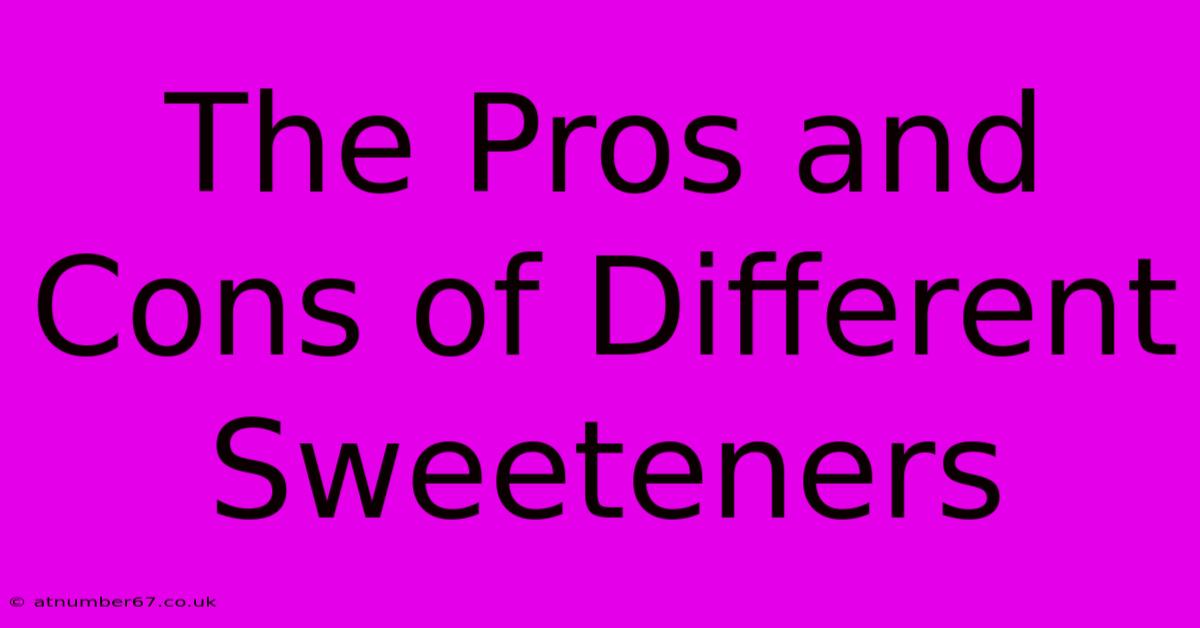The Pros And Cons Of Different Sweeteners

Table of Contents
The Pros and Cons of Different Sweeteners: Which One's Right for You?
Choosing the right sweetener can feel like navigating a minefield. With so many options available – from granulated sugar to stevia and everything in between – understanding the pros and cons of each is crucial for making informed decisions about your diet and health. This comprehensive guide will break down the advantages and disadvantages of popular sweeteners, helping you choose the best option for your individual needs.
Granulated Sugar (Sucrose): The Classic Sweetener
Pros:
- Familiar Taste and Texture: Granulated sugar offers a familiar, widely accepted sweetness and texture that's easily incorporated into various recipes.
- Cost-Effective: It remains one of the most affordable sweeteners on the market.
- Versatile: Suitable for baking, cooking, and beverages.
Cons:
- High Calorie Count: Granulated sugar is primarily empty calories, contributing to weight gain and potential health issues like type 2 diabetes if consumed excessively.
- Dental Problems: High sugar intake contributes to tooth decay and cavities.
- Potential Health Risks: Linked to various health problems, including heart disease, inflammation, and metabolic syndrome.
High-Fructose Corn Syrup (HFCS): The Controversial Choice
Pros:
- Cost-Effective: Often cheaper than granulated sugar, making it attractive for food manufacturers.
- Sweetness: Offers a high level of sweetness, enhancing the flavor of processed foods.
Cons:
- High Fructose Content: The high fructose content is metabolized differently than glucose, potentially contributing to liver problems, insulin resistance, and weight gain.
- Processed Ingredient: It’s a heavily processed ingredient, raising concerns about its overall impact on health.
- Negative Health Associations: Linked to various health issues, similar to granulated sugar.
Honey: Nature's Sweet Treat
Pros:
- Natural Sweetener: Derived from bees, offering a natural alternative to refined sugars.
- Antioxidant Properties: Contains small amounts of antioxidants, potentially offering some health benefits.
- Unique Flavor: Provides a distinct and complex flavor profile compared to granulated sugar.
Cons:
- High Calorie Content: Similar calorie density to granulated sugar.
- High Glycemic Index: Can lead to blood sugar spikes in some individuals.
- Allergies: Some individuals may have allergic reactions to honey.
Maple Syrup: A Delicious Alternative
Pros:
- Natural Sweetener: Derived from maple tree sap.
- Mineral Content: Contains trace minerals, such as zinc and manganese.
- Flavorful: Offers a distinctive, rich flavor that enhances many recipes.
Cons:
- High Calorie Content: High in calories and carbohydrates, similar to honey.
- High Glycemic Index: Can cause blood sugar spikes.
- Cost: More expensive than granulated sugar and honey.
Artificial Sweeteners: The Zero-Calorie Options
Pros:
- Zero or Low Calories: Ideal for weight management and calorie control.
- Intense Sweetness: Requires smaller amounts to achieve the same level of sweetness as sugar.
- Tooth-Friendly: Less likely to contribute to tooth decay than sugar.
Cons (Varying by type - Aspartame, Sucralose, Saccharin, Stevia):
- Potential Health Concerns: Some studies have raised concerns about the long-term effects of certain artificial sweeteners on health, although research is ongoing. These concerns vary greatly depending on the specific artificial sweetener.
- Aftertaste: Some artificial sweeteners can have a lingering aftertaste that some people find unpleasant.
- Nutrient Deficiencies: They provide no nutritional value.
- Potential Digestive Issues: May cause digestive upset in sensitive individuals.
Stevia: A naturally derived, zero-calorie sweetener. Often praised for its sweetness and minimal impact on blood sugar, though some individuals may find it slightly bitter.
Making the Right Choice
The best sweetener for you depends on your individual needs, health goals, and preferences. If you're looking to minimize added sugar, explore options like stevia, monk fruit, or erythritol. If you prioritize natural sweetness, consider honey or maple syrup in moderation. However, always consult with a healthcare professional or registered dietitian for personalized dietary advice, especially if you have any underlying health conditions. Remember, moderation is key regardless of the sweetener you choose.
Keywords: Sweeteners, sugar, honey, maple syrup, high-fructose corn syrup, artificial sweeteners, stevia, sucralose, aspartame, saccharin, health, weight loss, diet, calories, glycemic index, pros, cons, benefits, risks, nutrition, healthy eating, food.

Thank you for visiting our website wich cover about The Pros And Cons Of Different Sweeteners. We hope the information provided has been useful to you. Feel free to contact us if you have any questions or need further assistance. See you next time and dont miss to bookmark.
Featured Posts
-
Speed Net Worth Your Personalized Wealth Plan
Apr 04, 2025
-
Behind The Scenes Gurmit Singhs Daughters Instagram
Apr 04, 2025
-
Colin Josts Net Worth A Closer Look At His Endeavors
Apr 04, 2025
-
Daughters 1st Birthday The Best Year Yet
Apr 04, 2025
-
Anne Boleyns Son The Evidence Speaks
Apr 04, 2025
